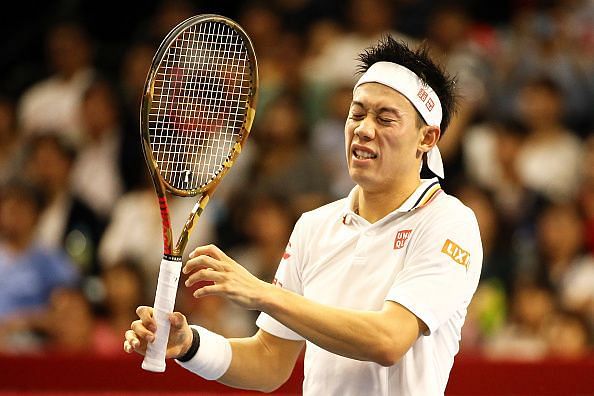The stage was set. The local hero received top billing. But, in the end, in front of a full house cheering for him, he failed to live up to the expectations. We've seen this happen time and again across sports, where the favorite messed up at the final hurdle. And, when they do, there's almost a sense of vulnerability surrounding them. They seem defenseless and there's nothing they can do to make it right.
In Tokyo, on Sunday, the stage was set for Kei Nishikori, against Daniil Medvedev, to win his home event after four long years. Prior to the final, he was the best player by a margin, and naturally the favorite for the title. But, what transpired in the final wasn't what was expected. Medvedev, a qualifier in Tokyo, blew Nishikori away with a delicate mix of power and precision.
At first glance, Nishikori's game looks complete - powerful forehand and one of the most efficient and attractive backhands on tour, with bankable volleying skills. It's only on a closer look that the glaring weaknesses appear. Nishikori's serve is one of the weakest amnng the top 50 players on tour. And while his baseline game is strong, against strong opponents who can outmaneuver him tactically, the serve completely falls apart and is taken advantage of.
Nishikori came into the Japan Open final on the back of some impressive all-round tennis throughout the week. There was also a streak that he had to end - consecutive losses in finals. And, as had mostly been the case at those finals, in Tokyo as well, he paid the price for a weak serve. Medvedev pounced on every single second serve and made the most of those, winning 12 of 17 second serve return points.
He executed his game plan perfectly right from the start and held on to it regardless of the consequences. Well, there wasn't much of a 'consequence' to care for, except him outperforming Nishikori in every department. But, it was important for him to stick to Plan A while enjoying a healthy lead and not give it away, and Medvedev did that perfectly.
Other than the serve, Nishikori's biggest disadvantage against Medvedev was the inability to put pressure on the Russian's weaker forehand wing on a consistent basis. He had mentioned before the match that he knew his opponent's strengths were his serve and backhand, and that he wanted to attack the forehand. He did, too. But only for the first 5 minutes, in the first game. Nishikori earned a break point which he couldn't convert.
And somewhat surprisingly after that, for a player as adept in returning as himself, Nishikori completely switched off for the rest of the match. He won a total of 1 point in the next 8 return games, resulting in an unwarranted defeat at the hands of a rising star. By the last point, he looked a little too spent mentally as he handed the Russian the win with a forehand error.
It's justifiable to have a bad day in the office, which could be one explanation for his dismal performance against a strong Medvedev. But, the worrying point is his streak of 8 consecutive losses in finals, following the one in Tokyo. Since winning in Memphis in 2016 (where he beat an eighteen-year-old Taylor Fritz), Nishikori has now lost 8 straight finals that he's appeared in. To make matters worse, he's won a combined total of 1 set in these 8 finals (against Grigor Dimitrov in Brisbane 2017).
In the meantime, he's lost finals against Novak Djokovic, Rafa Nadal, Marin Cilic, and even Alexandr Dolgopolov. Not quite something one would expect from a player of his calibre.
Some might want to squash it off because of his comeback from injury, but the truth is, his comeback started in January, and we're in October now. Nishikori has failed almost every time he's had to really up the ante against someone who's outwitting and overpowering him. Perhaps it all comes down to an inability on service games, but Nishikori looks a bit too mentally fragile in the finals. The mental weakness can very well lead to missing routine shots from both wings which he did in abundance in Tokyo.
Given his history of injuries, physical exhaustion can't be overlooked either, but that gets little support in this case, since he won all his matches in straight sets. He came into the final relatively fresh and feeling healthy.
This could've been the comeback stage for him, but he failed to impress when it mattered the most. Shanghai Masters poses a different challenge for him, and this defeat would surely be a setback. If his serve isn't working - chances of which are very high - it'll be a Herculean task for him to win big matches consistently and return to the level he once was at.

